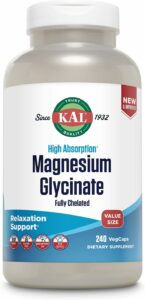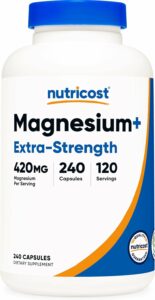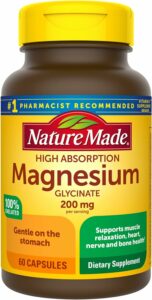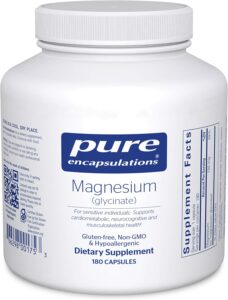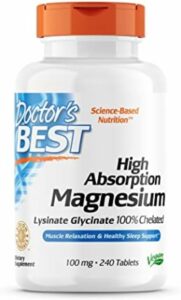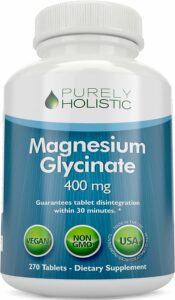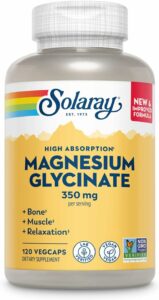Magnesium is a very important nutrient for our body. A magnesium deficiency can cause problems in our bodily functions.
It has been reported that, in the United States, about 50% of people are magnesium deficient. There are both minor and major implications for this, ranging from conditions such as fatigue, nausea, and leg cramps at night, to abnormal heart rhythms and seizures.
Here, we will discuss everything that you need to know about magnesium glycinate, why it is important, as well as the best magnesium glycinate for leg cramps that you can find on the market today.
Table of Contents
What is Magnesium Glycinate?
Magnesium is a vital nutrient that benefits the muscles, nerves, and bones. It can also help in regulating blood sugar levels, especially for those who are suffering from diabetes.
Other benefits of magnesium include the reduction of symptoms related to anxiety, PMS, and irregular heartbeat. It has also been proven to reduce pain.
Magnesium comes in many forms, with magnesium oxide being the most prevalent due to its affordability. However, this form of magnesium is not easily absorbed by the body.
On the other hand, magnesium glycinate combines magnesium with glycine, which helps it get absorbed by the body faster, allowing you access to its full benefits.
Other forms of magnesium include:
- Magnesium citrate
- Magnesium malate
- Magnesium threonate
- Magnesium taurate
Out of all these, magnesium glycinate is still considered as the superior form of magnesium due to its high bioavailability. It is also the form that has a lower risk of potential side effects.
Why Do You Need Magnesium Glycinate?
Taking magnesium glycinate is good for maintaining a healthy gut. It helps in easing conditions such as constipation and indigestion. It has also been said to be able to improve sleep.
As magnesium is also known for improving nerve function, magnesium glycinate can help in preventing and reducing seizures, especially for those suffering from eclampsia. It can also reduce incidences of leg cramps at night.
Magnesium glycinate also helps those with irregular heartbeat, asthma, diabetes, osteoporosis, and certain cancers by managing the complications caused by these diseases and conditions.
Those who have certain issues like liver or heart failure, as well as those who have diarrhea or have vomited can also benefit from magnesium glycinate as it can help replenish lost magnesium stores within the body.
Other benefits of taking magnesium glycinate regularly include relieving the symptoms of PMS in women, reducing pain, helping treat some infections, and reducing birth-related complications for both the child and the mother.
What is the Recommended Dosage for Magnesium Glycinate?
The National Institutes of Health recommends anywhere between 30 to 420 milligrams of magnesium glycinate per day, depending on the person’s gender and age.
Those who are pregnant or breastfeeding may be recommended higher levels of this mineral.
However, it is still recommended to consult with your doctor so that they can check up on you to ensure that you are getting the right daily dosage.
The recommended daily magnesium intake for relatively healthy people is as follows:
- Up to 30 milligrams for babies up to 6 months old
- From 75 to 240 milligrams for infants to children up to 13 years old
- Up to 410 milligrams for teenage boys
- Up to 360 milligrams for teenage girls
- Up to 420 milligrams for adult males
- Up to 320 milligrams for adult females
- From 310 to 400 milligrams for pregnant and breastfeeding women
What are the Side Effects of Magnesium Glycinate
Before taking magnesium glycinate for leg cramps at night, to help treat some conditions, or just for general health, it is recommended to consult with a medical professional.
The reason for this is that there are possible side effects as well as risks involved when taking this as a supplement.
Possible side effects would include diarrhea, stomach cramps, upset stomach, some electrolyte imbalances, irritability, and vomiting, among others.
It is also recommended to seek medical advice if you have diabetes or any liver, heart, or kidney-related issues before taking magnesium glycinate.
Those with high blood pressure or taking medications should seek permission from a doctor first, as well. This is because some medications and magnesium can interact or interfere with each other and reduce their effects.
Best Magnesium Glycinate for Leg Cramps
If you are suffering from leg cramps at night, you can benefit from taking magnesium glycinate daily. Not only can it help ease muscle cramps, but there are a lot of other benefits as well, as mentioned above.
Numerous magnesium glycinate supplements can be found online, each with its own pros and cons.
We have compiled some of the best magnesium glycinate for leg cramps in the list below. Any of these items can provide you with a good dose of magnesium for your daily nutritional needs.
1. KAL Magnesium Glycinate
Each serving of KAL Magnesium Glycinate contains 350 milligrams of the mineral. The product also contains 5 milligrams of black pepper extract which further aids in magnesium absorption.
KAL Magnesium Glycinate comes in vegetable capsule form. They were produced in a GMP-certified facility, are tested in the USA, and the bottles that they come in are eco-friendly as well, having been produced using recovered plastic.
Pros
- Vegan formulation
- Has a 60-day money-back guarantee
- Gluten-free and soy-free
Cons
- You need to swallow 4 capsules to get the full dose
- Some users preferred the old formulation in tablet form
2. Nutricost Magnesium+ Extra-Strength
Coming in capsule form, Nutricost Magnesium+ Extra-Strength is composed of a combination of magnesium glycinate and magnesium oxide.
Magnesium oxide is considered as the cheaper and slower-to-absorb form of magnesium. Unfortunately, there is also no information on the ratio of the mix.
Nutricost Magnesium+ Extra Strength is soy-free, gluten-free, vegan, and non-GMO. The product was also made in a GMP-compliant facility to ensure high quality and safety.
Pros
- Vegan formulation
- Easy-to-swallow capsules
- Provides 100% of the daily recommended dose of magnesium
Cons
- Not composed of pure magnesium glycinate
- Many did not like the change in ingredients due to magnesium oxide being slower for the body to absorb
3. Nature Made Magnesium Glycinate
Nature Made Magnesium Glycinate is a cost-effective way to start when taking magnesium glycinate. It has a relatively low dose which, in itself, is not a bad thing, especially if you just want to try it out. Each capsule contains about 100 milligrams of magnesium glycinate.
The product comes in capsule form and was made without any gluten. The fact that Nature Made is a very trusted brand is also a very good reason why Nature Made Magnesium Glycinate makes our list.
Pros
- Good price
- No artificial colours or flavours
- Pure magnesium glycinate
Cons
- Low magnesium glycinate content per capsule
- Contains gelatin
4. Pure Encapsulations Magnesium Glycinate
One capsule of Pure Encapsulations Magnesium Glycinate contains 120 milligrams of magnesium glycinate. This provides a gentle dose for those just trying out the mineral as a supplement for the first time.
Pure Encapsulations Magnesium Glycinate is free from allergens such as nuts, wheat, soy, gluten, and various shellacs, fillers, artificial colours, preservatives, fats and oils, or fillers.
Pros
- Pure magnesium glycinate
- No unnecessary additives
- Consistent formulation and production standard
Cons
- Very expensive
- The dose is a bit low per capsule for the price
5. Doctor’s Best High Absorption Magnesium
Doctor’s Best High Absorption Magnesium is made of pure magnesium lysinate glycinate chelate. Each serving, comprising two tablets, provides 200 milligrams of magnesium in total.
The product is comprised of vegan ingredients and is guaranteed to be non-GMO. It is also gluten-free and soy-free, making it a good magnesium glycinate source for those with allergies to these substances.
Pros
- Fast absorbing
- -Vegan formulation
- Very good for improving sleep
Cons
- You will need multiple tablets to get 100% daily recommended values
- Hard to swallow despite being in tablet form
6. Purely Holistic Magnesium Glycinate
Purely Holistic Magnesium Glycinate comes in tablet form, and each tablet contains 200 milligrams of magnesium in the form of magnesium glycinate.
The product is said to disintegrate within 30 minutes of ingestion. Purely Holistic Magnesium Glycinate is also free from GMOs, is suitable for vegans, and does not contain any soy, gluten, or dairy.
Pros
- One bottle is equal to a four-month supply
- No artificial chemicals or fillers
- Can be crushed and mixed in with food or drinks
Cons
- Pills are very large
- Various side effects such as diarrhea or constipation may be possible
7. Solaray High Absorption Magnesium Glycinate
Solaray High Absorption Magnesium Glycinate comes in veg caps that provide 350 milligrams of magnesium glycinate with each serving. It also comes with a 60-day refund policy if you are not happy with the product.
The product has added black pepper extract, making it more efficient in the body’s absorption. Solaray High Absorption Magnesium Glycinate is manufactured in Utah and comes in bottles made with recycled plastic from oceans and landfills.
Pros
- Fast absorption by the body due to black pepper extract
- Eco-friendly bottles
- Vegan-friendly
Cons
- It takes four capsules to get the recommended dosage
- Smell and taste are bad for some users

